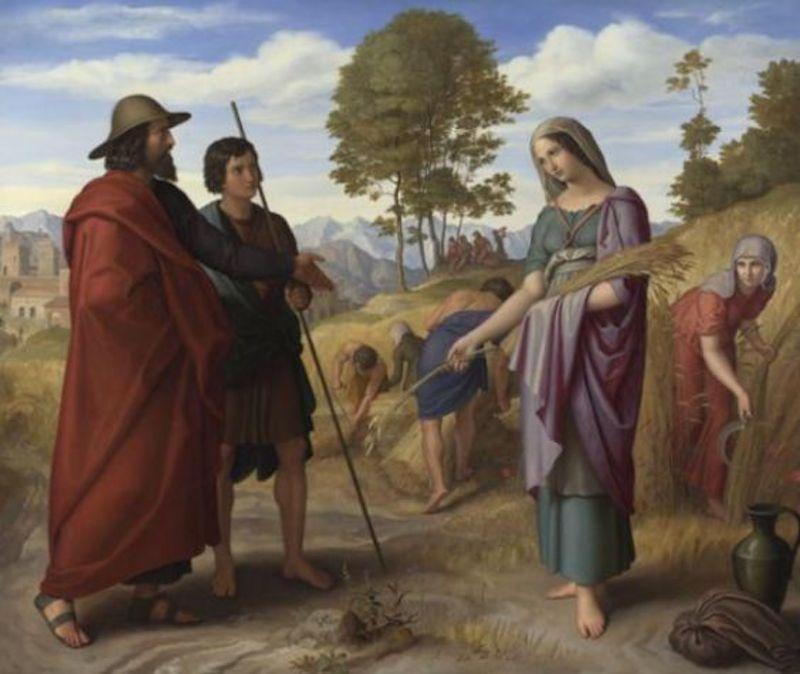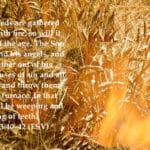Ruth and Boaz: A Love Story for the Ages
Ruth and Boaz A Love Story for the Ages
Ruth 1:1-9; 2:1-13; 3:1-12; 4:13-17; Ephesians 5:25-29
February 14, 2016 (Big Springs URC) • Download this sermon (PDF)
Beloved congregation of Christ: Today, we will take a break from our study of the Gospel of John to start a short series on the Book of Ruth. We often hear about this much-loved book as an idealized, romantic love story between Ruth and Boaz, Ruth’s commitment and faithfulness to Naomi, and Boaz’s kindness and generosity. But are these the only themes in this book, as told in many sermons and children’s Sunday schools?

The Book of Ruth is so named because the main character is Ruth, a Moabite widow who married Boaz, a landowner in Bethlehem. Who is the author of this book? The author is unknown. When was it written? Since King David is mentioned in Ruth 4:17-22, the date of writing must be after David became king about 1000 B.C. But the story happened during the time of the judges when Israel had no king as yet (Ruth 1:1).
What is the theme of this book, that it was recognized by Jews as part of the canon of the Old Testament? It is because the story displays God’s sovereignty over all people and events. It also demonstrates his sovereignty through his covenant love and kindness towards his own people, even in difficult circumstances. But the most important feature of the book is that God exercises his sovereignty and covenant love for his ultimate purpose: to save his people from sin by sending his Son Jesus Christ through the line of Boaz and King David. The book is rich in theological and ethical features that are often missed by many pastors and theologians.
Today, we will have an overview of the Book of Ruth, which is not only a story about Ruth, but about Naomi, Boaz, and most importantly, about our Lord Jesus Christ. Since this is an overview of the book, the themes of the book will be explored in more detail in the next several Sundays. We have three headings, which you might find unusual:
- The Blind Bate: She Finds Favor in His Eyes
- The Midnight Proposal: She Did What?
- The Blessed Wedding: The Newlyweds Bear a Son!
The Blind Date: She Finds Favor in His Eyes
The book starts with the migration of Elimelech, his wife Naomi, and their two sons, from Bethlehem to Moab. The time period of this story is pointed out: “in the days when the judges ruled” (Ruth 1:1). We know that the days of the judges were characterized by Israel’s cycle of rebellion against and return to the Lord. The Book of Judges had a frequent refrain, “In those days there was no king in Israel. Everyone did what was right in his own eyes” (Jdg. 17:6; 18:1; 19:1; 21:25). Israel needed a leader, a king, to right a ship floundering in idolatry and immorality.
Why did they go to a land whose people have been enemies of Israel even from the time of Moses? Chapters 22-25 of the Book of Numbers tell us about Moabites’ war against Israel. Since they could not defeat the Israelites in battle, the Moabites used the services of Balaam, a pagan wise man from the East, to pronounce curses on Israel. But this scheme did not work, because the Spirit of God put words of blessing instead of curses on the lips of Balaam. Finally, the Moabites devised another plan: they would send their beautiful women to the men of Israel to seduce them. Then these women will then invite the men to worship their pagan god Baal. This happened in a place called Peor. So God’s anger was kindled against these men, and he sent a plague that killed 24,000 Israeli men (Num 25:9).
But now, Elimelech takes his family to this pagan land of Moab because of a famine in the land of Judah. At first, Elimelech planned to only “sojourn” there, but later, they “remained there,” probably because they had prospered in this foreign land. But then, tragedy struck! Elimelech died, and then ten years later, Naomi’s two sons also died. Who will take care of Naomi, now that she was “ left without her two sons and her husband”? These two sons also married Moabite women, so who will take care of these three women?
Naomi had no recourse but to send her two daughters-in-law back to their fathers’ homes. She tells them that she was too old to find another husband to support them. And since the daughters-in-law were still young, they can still find husbands, “The Lord grant that you may find rest, each of you in the house of her husband!” (Ruth 1:8-13)Naomi seeking rest for Ruth, and then finding rest for Ruth in the end is one of the themes of the book.
So Orpah, one of her daughters-in-law, bid her goodbye, but Ruth, the other one, “clung to her” (Ruth 1:14). She answered Naomi with this well-beloved passage,
Do not urge me to leave you or to return from following you. For where you go I will go, and where you lodge I will lodge. Your people shall be my people, and your God my God. Where you die I will die, and there will I be buried. May the Lord do so to me and more also if anything but death parts me from you (Ruth 1:16-17).
Ruth’s faithfulness and kindness to Naomi is another major motif of the book. Not only was she faithful and kind to Naomi; she was also faithful to Naomi’s people and to Naomi’s God, the God of Israel. Together, the two widows made their long trek back to Bethlehem. When they arrived there, the whole town was “stirred,” excited, or even surprised. After being absent for ten years, they came back, but they came back empty, without husbands, and without a home (Ruth 1:19).
When they arrived, it so happened that it was “at the beginning of the barley harvest” (Ruth 1:22). So Ruth volunteers to glean in the fields, and “she happened” to glean in the fields of Boaz, a relative of Naomi’s husband Elimelech. Boaz then saw this stranger gleaning in his field, and inquired about her, “Whose young woman is this?” And Boaz was told, “She is the young Moabite woman, who came back with Naomi from the country of Moab.” Boaz was probably trying to confirm what he had already heard from the townsfolk (Ruth 2:1-7).
There were probably a few other women gleaners in the field, but Boaz noticed “Ruth the Moabite” woman. It is interesting too that this name stuck with Ruth from the time she arrived in Bethlehem until the end of the story after she gave birth to a son. So in the fields of Boaz, the two met. Boaz’s attention and kindness to Ruth was obvious in verses 8-13. He asked her to glean only in his field. He “charged the young men not to touch” her. And she was welcome to drink the water of his men. Later, he also instructed his men to let her glean anywhere, and even pull out some grain from their bundled sheaves. Ruth was struck at Boaz’s kindness, bowing to him, saying, “Why have I found favor in your eyes, that you should take notice of me, since I am a foreigner?” But Boaz answered with his own admiration of Ruth’s kindness and faithfulness to Naomi, “All that you have done for your mother-in-law since the death of your husband has been fully told to me, and how you left your father and mother and your native land and came to a people that you did not know before.
Boaz even said a prayer for Ruth, “The Lord repay you for what you have done, and a full reward be given you by the Lord, the God of Israel, under whose wings you have come to take refuge!” God’s wings, under which Ruth and Naomi sought refuge, is another repeated theme in the story (see also Psa 61:4; 91:4). Ruth then thanked Boaz humbly for his kindness, “I have found favor in your eyes, my lord, for you have comforted me and spoken kindly to your servant, though I am not one of your servants.” But Boaz’s kindness to her was not yet finished. In verses 14-16, after Ruth gleaned all morning under the sun, Boaz invited her to lunch together with all his men. She ate until she was full, and even had leftovers that she brought back to Naomi.
So this is why the title of this point is “The Blind Date.” It is as if Naomi had arranged this meeting between Ruth and Boaz. “She happened” to glean in Boaz’s field is not luck or chance, but God’s providence. Ultimately, it was the Lord who arranged this “blind date” for a much larger purpose. And it is hard not to notice that Boaz became interested in Ruth as soon as he saw her. Perhaps this is “love at first sight,” as the Lord would have it.
But this is not your typical Hollywood “boy meets girl and they lived happily ever after” love story. Ruth was probably a beautiful young woman, for she belongs to Moab, who had seduced the men of Israel at Peor with their beautiful young women. Ruth was also physically strong, being able to glean under the sun for a whole day, and then carry back home an ephah of barley weighing about 30-35 pounds. But Boaz was probably a middle-aged single man, which would not make an ideal story of a beautiful, young, perfect couple.
And it is also not your Shakespearean tragedy of Romeo and Juliet. Because this “love story” really turned out to have a “happy-ever-after” ending.
The Midnight Proposal: She Did What?
When Ruth came home, she told Naomi everything that happened, from meeting Boaz to the lunch invitation, and showed her how much she had gleaned. Naomi was pleased that her “blind date” scheme had worked. They met, and she “found favor” in his eyes. Naomi gave it some time for Boaz to move his relationship with Ruth forward, but Boaz did not make any move. He must have been hesitant to be more than just a kind friend to Ruth and Naomi. There was no whirlwind romance.
What else could Naomi do? In Chapter 3, she affirms her commitment to Ruth to “seek rest” for her. She has to find a husband who would support Ruth and herself. So she instructs Ruth to take the initiative in the relationship, “Wash therefore and anoint yourself, and put on your cloak and go down to the threshing floor.” What she was saying is, “Take a nice bath, put on some perfume, and dress in your most attractive clothes. Then observe where Boaz goes to lie down for the night, and go to him after he lays down for the night at the threshing floor (Ruth 3:1-5).
Is her plan too obvious? Yes, it is. But Ruth has no qualms about obeying her mother-in-law, saying, “All that you say I will do.” One of Naomi’s instructions to Ruth is, “Then go and uncover his feet and lie down, and he will tell you what to do.” So Ruth did all that Naomi instructed her to do. She lay down at the feet of Boaz at the end of the heap of grain, while he was sleeping. At midnight, Boaz awoke and was startled that a woman lay at his feet! “Who are you?” he asked. And she answered, “I am Ruth, your servant.”
But she added a strange plea to Boaz that Naomi did not ask her to say, “Spread your wings over your servant, for you are a redeemer” (Ruth 3:9). What did she mean by this? Much ink have been spilled about this verse, including the idea that Naomi wanted Ruth to sleep with Boaz in the intimate sense. Ruth was obeying Naomi’s wishes. But this statement means one thing: Ruth was proposing to Boaz at midnight! “Marry me, and do your duty as our kinsman-redeemer.” Boaz is a relative of Naomi, and his duty is to redeem the inheritance of Elimelech before Naomi sold it outside of her family (Num 27:11). In addition to this, the law requires the kinsman-redeemer to marry the widow left behind, and father a son to perpetuate the dead man’s family line (Deu 25:5-6).
But instead of rebuking Ruth for her unconventional proposal and presumption, Boaz praised her, “May you be blessed by the Lord, my daughter. You have made this last kindness greater than the first in that you have not gone after young men, whether poor or rich.” She didn’t go after handsome men in the prime of their youth, but after him who is already past his prime. Then, just as Naomi said, Boaz gave Ruth instructions on what to do next. He admitted that he is a kinsman-redeemer, but there is a closer relative who might be interested in redeeming Ruth and Naomi. Boaz will ask him first, and if he declines, then he will redeem her, which also means taking her as his wife (Ruth 3:6-13).
The Blessed Wedding: The Newlyweds Bear a Son!
That same day, Boaz gathered the elders at the gate of Bethlehem to do everything according to the law of Moses. He asked the other kinsman-redeemer to attend the meeting. Then he told everyone in the meeting that Naomi is now selling the property left to her by her deceased husband. When Boaz asked this other relative if he was willing to redeem Naomi’s property, he agreed. But Boaz was also skillful in pointing out that the law says that the kinsman-redeemer’s duty is not only to redeem Naomi’s property. He also has to marry the widow, who is Ruth the Moabite, “in order to perpetuate the name of the dead in his inheritance.” With this requirement, the other relative declined (Ruth 4:1-6).
Now, Boaz was free to marry Ruth, who is not called “Ruth the Moabite,” the foreigner, anymore. She is now part of his own family in Bethlehem. The Lord blessed them, “gave her conception,” and “she bore a son” named Obed. Obed became the grandfather of King David, who became the ancestor of our Lord Jesus Christ (Ruth 4:13-22). Like Ruth, Mary the mother of Jesus, found favor with God, and she bore a son who was named Jesus, Redeemer of his people.
The story that begins with the death of Naomi’s husband and two sons ends with life in the birth of the son of Boaz and Ruth. It began with the Naomi’s emptiness, and ends with her fullness as a son was born to her. It began with Ruth working all day long in the field, and ends with her finding rest in her husband and son. It began with bitterness in Naomi’s life, and ends with a pleasant surprise, her property redeemed, and a son.
Dear brothers and sisters in the Lord, may we find rest in the story of Ruth and Boaz. It is not a mere love story with a happy-ever-after ending.
For you too, like Naomi’s husband and two sons, were dead in your sins. But our Lord Jesus Christ, Ruth and Boaz’s descendant, gave you life when he gave himself up on the cross to die for your sins. You too were empty, hungry and thirsty, deprived. But Christ satisfied your thirst and hunger, not only for food, but for righteousness. You too were laboring, doing good works, to attain salvation in heaven. But Christ gave you rest from your spiritual labors, because he did all the work required of you to get you to heaven. He is your refuge, and under his wings, you found life, satisfaction, righteousness, and rest.
Our pilgrimage in this wilderness is filled with sorrows, sufferings and afflictions. We only see God’s frowning Providence, but hidden behind this frowning Providence is his smiling Providence. Behind the scenes of your life stories, he is working all things, even bad things, for your good. Behind all the emptiness, he is working out your fullness. Behind all the sin and death around you, he is working out your redemption. Behind all your wearisome labors, he is working out your everlasting rest.
You have no other Kinsman-Redeemer but Jesus Christ. As Ruth and Boaz were kind and faithful, so too Christ our Elder Brother and Redeemer is kind and faithful to you, not only in this age, but for ages to come.



